|
|
|
Sort Order |
|
|
|
Items / Page
|
|
|
|
|
|
|
| Srl | Item |
| 1 |
ID:
163842
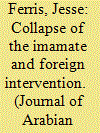

|
|
|
|
|
| Summary/Abstract |
his paper considers the various factors at play in the buildup to the 1962 revolution and its immediate aftermath, focusing on the role of foreign and particularly Egyptian intervention. Relying primarily on Yemeni and Egyptian sources, it concludes that the collapse of the Imamate owed primarily to domestic factors, and that Egyptian involvement proved more important to the outcome of the revolution than to its instigation.
|
|
|
|
|
|
|
|
|
|
|
|
|
|
|
|
| 2 |
ID:
163833
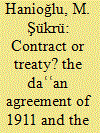

|
|
|
|
|
| Summary/Abstract |
A seminal flashpoint in the scholarly discussion of the post-1872 relationship between the Ottoman empire and its province of Yemen is the Daʿʿan Agreement of 1911. Previous scholarship studying this agreement and its historical context insists that the Ottoman government conceded administrative authority to Imām Yaḥyā Ḥamīd al-Dīn bordering on independence across a vast portion of the Province of Yemen. This study asserts otherwise. The devolution bestowed upon him was far more limited, and the Ottoman authorities never treated him as a leader on equal footing with them. They granted autonomy solely on a contractual basis which could be annulled by the authorizing party, not by a treaty to be adhered to by all contracting parties. The article examines the relations between Imām Yaḥyā and the Ottoman Government beginning with the Zaydī leader’s de facto control over the Jibāl, or the highlands within Upper Yemen. It focuses on the preparations and implementation for the contract of Daʿʿan and discusses Imām Yaḥyā’s status following the contract and the nature of his authority over the region delimited by this agreement.
|
|
|
|
|
|
|
|
|
|
|
|
|
|
|
|
| 3 |
ID:
163852
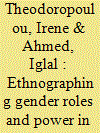

|
|
|
|
|
| Summary/Abstract |
This ethnographic study examines how gender roles associated with male and female Qatari students in intercultural communication courses in a university in Qatar are negotiated between them and their two female instructors from the US and Greece. Our aim is to contribute towards the development of good practice related to the teaching of information exchange among group members who are not culturally alike,1 by arguing that an efficient way of overcoming misunderstandings between instructors and students is to engage in a pedagogical approach, which we call “dialogical infotainment”. This serves the ultimate goal of sharing various types of power in order to sharpen our cultural sensitivity and subsequent tolerance and respect for each other’s gender role-related peculiarities.
|
|
|
|
|
|
|
|
|
|
|
|
|
|
|
|
| 4 |
ID:
163846
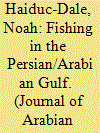

|
|
|
|
|
| Summary/Abstract |
The last two centuries have brought dramatic changes to the Persian/Arabian Gulf. Yet while imperial politics and newfound wealth altered much about coastal Gulf societies, fishing remained a remarkably steady enterprise. Rather than immediately changing alongside regionally altering events, fishing provided a stable livelihood for many Gulf coast residents throughout the eighteenth and nineteenth centuries, and even beyond the first half of the twentieth century. The main contention of this paper is that due to environmental limitations, the Gulf provided enough resources for local consumption, but not enough to justify large investment by foreign powers, such as the British Empire. This fact left local fishermen and political leaders in control of fishing. It also enabled fishermen to adapt to new technologies and markets at their own pace, rather than being compelled to do so by imperial powers. Even the twentieth century oil economy initially provided new markets for traditional fisheries rather than replacing them with industrial fishing fleets.
|
|
|
|
|
|
|
|
|
|
|
|
|
|
|
|
| 5 |
ID:
163837
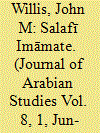

|
|
|
|
|
| Summary/Abstract |
This article reassesses the reign of Imām Yaḥyā Ḥamīd Al-Dīn (r. 1904–48), the historiography of which has emphasized its perceived political, economic, and intellectual isolation. In contrast to this view, this article situates the rise of Imām Yaḥyā and the formation of the Mutawakklite Kingdom of Yemen in interwar movements of anti-imperialism and moral reform that were global in ambition and reach. Rather than remaining isolated from broader political and intellectual trends, Imām Yaḥyā actively engaged the reformist project of the Sunnī-salafī movement through the growing medium of the trans-regional Arabic press and the post-Ottoman associational life of the interwar Muslim congresses.
|
|
|
|
|
|
|
|
|
|
|
|
|
|
|
|
| 6 |
ID:
163849
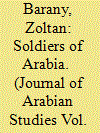

|
|
|
|
|
| Summary/Abstract |
Since the 1960s many democracies and prosperous authoritarian states have abolished national military service but in recent years that trend has been reversed in several European states — owing primarily to the changing security environment — and, more surprisingly, in Arabia. Three Gulf Cooperation Council states, Kuwait, Qatar, and the United Arab Emirates recently introduced conscription for their armed forces. Although this development may be explained in part by emerging external security challenges, this paper argues that the primary explanatory factors are intraneous: socioeconomic reasons, military-strategic motives, and political considerations. The article contends that the most important objective of the Gulf governments that introduced conscription is nation-building, that is, to deepen the relationship between citizens and the state.
|
|
|
|
|
|
|
|
|
|
|
|
|
|
|
|
| 7 |
ID:
163840


|
|
|
|
|
| Summary/Abstract |
This article deals with the reminiscences of Amat al-Laṭīf al-Wazīr, only daughter of ʿAbdullah al-Wazīr, one of the leaders of the Yemeni reform movement which sought to establish a constitutional government in the late 1940s. Against the background of her family’s devastation and dispossession following the failed revolt, the article explores the intricacies of her memory. Most studies of this period tend to privilege men’s heroic political narratives over the everyday struggles of women who unwittingly became victims of the ensuing turmoil. Amat al-Laṭīf al-Wazīr’s story highlights the effect violent conflict has on kinship relations and on the lives of survivors who were accustomed to men’s support and protection. Telling her story through an intersubjective lens, she makes claims as to how her father’s ill-fated attempt to refashion the twentieth-century Yemeni imamate should be remembered.
|
|
|
|
|
|
|
|
|
|
|
|
|
|
|
|
| 8 |
ID:
163830
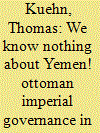

|
|
|
|
|
| Summary/Abstract |
This article analyzes changing concepts and practices of knowledge production and governance in the Ottoman Province of Yemen from the re-conquest of the Yemeni highlands in 1871–3 to the beginning of the First World War. It argues that, while Ottoman bureaucrats embraced modern governmentality by emphasizing the connection between local knowledge and effective governmental control, the production of knowledge about the political, social, cultural, and economic realities of southwest Arabia during this period cannot be reduced to acts of writing and the creation of government archives. While historians of the late Ottoman Empire have often suggested that knowledge production –– like other elements of imperial governance during the period under study –– became increasingly systematic and informed by bureaucratic rationality, I argue that in fact personal relations and oral communications remained the hallmarks of Ottoman knowledge production in Yemen until the early twentieth century. This began to change when the near collapse of Ottoman rule in Yemen in 1905, the end of the Hamidian regime in 1908–09, and new notions of professionalism prompted officials to view existing practices of knowledge production and transmission as partly responsible for the government’s failure to control this province. Now, they increasingly associated authoritative knowledge with published, scholarly accounts, while considering unrecorded knowledge unreliable.
|
|
|
|
|
|
|
|
|
|
|
|
|
|
|
|
|
|
|
|
|